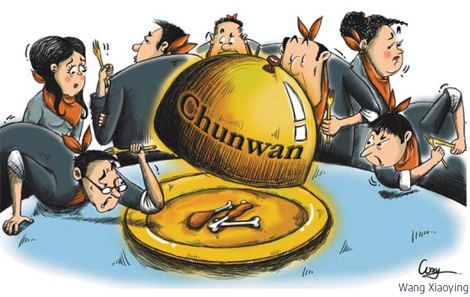Time for a Gala of, by and for the people

People say I am an elitist because I never watch the CCTV Spring Festival Gala - otherwise known as Chunwan. It has been broadcast for almost 30 years and has the highest viewer ratings, with an estimated 70 percent of Chinese families tuning in.
Chunwan is a modern Chinese tradition, or addiction, depending on your viewpoint. Nobody really watches the whole thing for 5 hours. People just turn the set on at 7 pm and do other things, like cooking, chatting, spitting sunflower seeds, whatever. It is the ubiquitous background noise to the Chinese New Year's Eve family celebration.
In case you have not seen it, Chunwan is Pompeian in style. It is similar, in fact, to a lot of Italian television, minus the boobs. Anyway, because it is the most-watched TV program in the universe, it has the ability to turn unknown entertainers into overnight megastars.
I don't watch it because it is boring. For almost 30 years the show has not changed its format, or even the stars that appear on the show. Every year, dozens of Barbie-like folk singers soar on high notes in praise of the Motherland, accompanied by troupes of dancers twirling umbrellas or waving fake flowers.
Then, near midnight, comes what everyone has been waiting for, Chinese comedian of the century Zhao Benshan. He's a stand-up comic from Northeast China who made his first appearance on Chunwan some 20 years ago. Now he travels in his very own Gulfstream 7 -- which is precisely why so many comics want to be on Chunwan.
Every year he produces a little skit, not unlike those performed by high school students on talent night. He's raised quite a few chuckles over the years and would have been declared a national treasure if he had not chosen to take up Canadian citizenship last year.
So, for years, Chunwan has been treated as infallible, and its stars and producers have been treated like royalty in the entertainment and media industry. But, this year, it's been a little different.
First of all, the Shanghai comedian Zhou Libo refused to appear on Chunwan. Apparently, a six-man team was dispatched to the city to persuade him to appear on the program. He firmly said, "No", and later gave an interview explaining that what he does is "art" not mere "entertainment". This was a slap in the face to a creative team that has considered itself beyond reproach for many years.
Then came the scandal of copyright infringement just 10 days before the show was to air. Ma Weidu, the leading Chinese authority on antiques, decided to sue Chunwan for adapting a short story he wrote into a skit, without paying him a royalty fee.
As he explained in his blog, he was ready to let the whole thing slide until Chunwan sent a junior female editor to get him to sign the release letter. The editor was pompous and rude which made Ma change his mind about signing the release letter. He decided he wanted to teach them a lesson. So, the editor decided to pay him a visit to his office. She was late and when she got there, she started by saying, "If I had known you are famous, I would have treated you differently."
The story was spread all over the Internet.
This wasn't the end to all the troubles. After Chunwan was broadcast it was met with a chorus of disapproval because of the rampant commercialization. Numerous examples of product placement annoyed the laobaixing (or common people) - the show's core audience.
And to add salt to the wound, Zhou, the Shanghai comedian, agreed to do a six-part TV program on Shanghai TV, which surpassed Chunwan in the ratings.
The lesson here is taste has changed, we have become more middle class. We are beginning to tire of the Pompeian sing-alongs. Instead, we want some programming that is by the people, for the people and of the people. Yes, it all comes back to what laobaixing wants to watch.
And finally, in my own defense, I'm not an elitist, I am simply middle class.
 0
0 







Go to Forum >>0 Comments